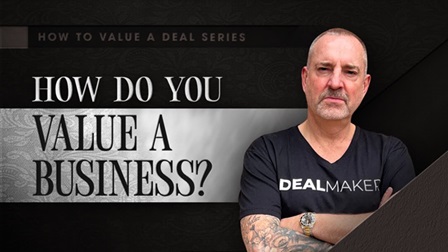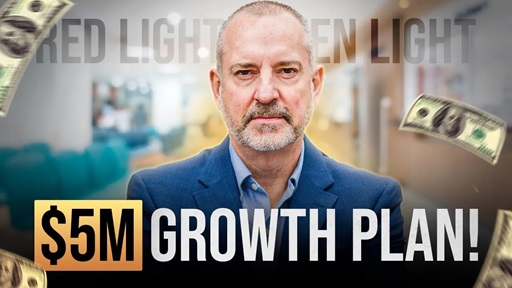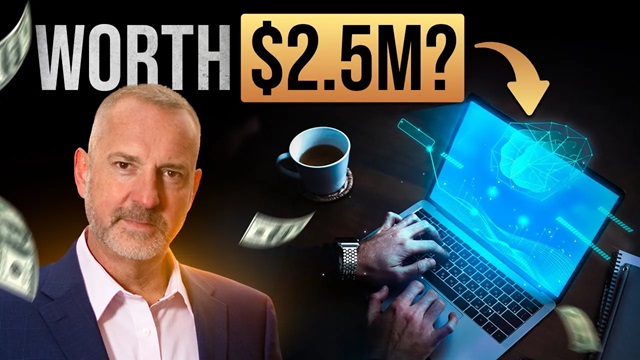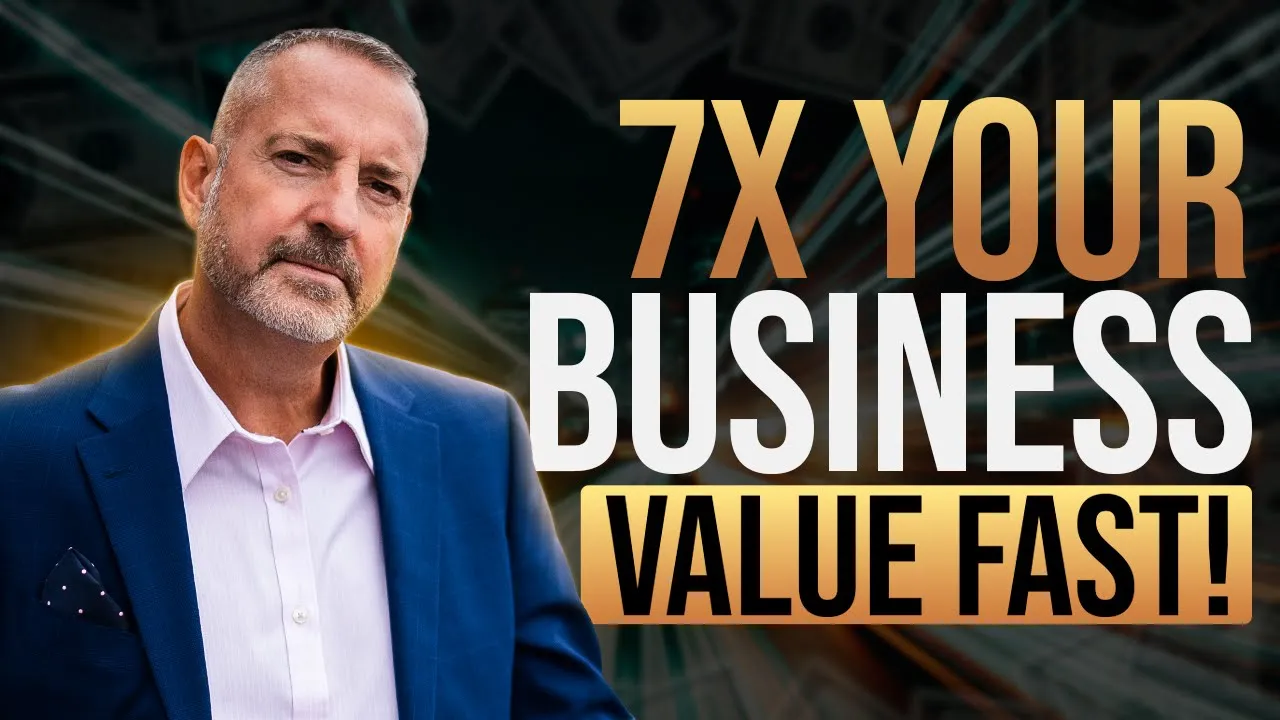Business Valuation: Your Expert Guide – Part 1
Business Valuation: Your Expert Guide – Part 1
In this introductory video of a five-part series, Carl Allen addresses the crucial question of how to value a business, explaining that business valuation hinges on four main components: financial valuation, deal structure, seller psychology, and transfer of value. Initially, he delves into financial valuation, where the focus is on analyzing income statements, balance sheets, and profitability. This step is essential, yet incomplete without considering how deal structuring can significantly alter a valuation based on the terms of payment.
The second component, deal structure, reveals that paying the seller upfront or through a multi-year arrangement can impact valuation. Allen explains that a structured payment over time could double the price compared to a cash-at-close transaction, as the terms redistribute financial risk between buyer and seller. This dynamic shifts valuation from a pure number to a flexible figure influenced by deal timing and payment arrangements.
Allen introduces seller psychology as the third element, highlighting how an owner’s personal motivation impacts valuation. For instance, a motivated seller who is eager to retire might accept a lower offer, while a contented owner might demand a premium. Understanding the seller’s mindset allows buyers to shape offers in ways that align with the seller’s goals and circumstances.
The fourth element is the transfer of value, which assesses the true worth of a business beyond financials, considering factors like brand reputation, customer concentration, and owner dependency. Without adequate transferability, even a financially sound business may fail under new ownership. Allen stresses the importance of evaluating aspects like customer retention and operational redundancy for long-term success.
This series promises an in-depth look at these components, offering practical advice on applying each valuation aspect. Allen concludes by inviting viewers to engage, leave questions, and subscribe for more insightful content on deal-making and business acquisition.
Full Transcript:
Everyone’s always asking me, you know, Carl, how do you value a business? Right? What’s the process of valuing a business? So what’s really, really interesting is valuation of a business really comes down to four very specific things. Right?
Good morning, guys. Carl Allen. Hope all is well. Now this is an introductory video as part of a five video series where we’re gonna talk about valuation.
So what’s really interesting about valuation is it’s probably one of the most asked questions in deal making. Right? And it’s one of the oldest questions, that people will will ever ask. You know, whenever I go on TV or on a podcast or on the radio or I’m talking to my students or I’m talking to you guys, everyone’s always asking me, you know, Carl, how do you value a business?
Right? What’s the process of valuing a business? So what’s really, really interesting is valuation of a business really comes down to four very specific things. Right?
Most people, like, if you talk to a CPA or you talk to a bank or you talk to an investor, they’ll only tell you about financial valuation, which is number one. So financial valuation is looking at income statements, it’s looking at balance sheets, it’s looking at assets and liabilities, it’s looking at profitability, it’s looking at things called add backs and take backs and all of those kind of financial elements of a business that you need to understand to come up with evaluation. But most of the people in the world only look at financials as a way of valuing a business. So what’s really interesting is there’s three other ways that you need to look at valuation.
You need to look at a business and an owner through three other different lenses to kind of round out the valuation conversation. So once you’ve looked at the financial valuation and on the next video, I’m gonna teach you how that works, but then what you’ve also got to look at is how the structure of the deal impacts the valuation. So you do the analysis financially, which will be video number one, and you’ll say, well, okay. I’ve got my income statement.
I’ve got my EBITDA. I’ve got my balance sheet. I’ve got my trends over a number of years. I’ve got my ad backs.
I’ve got my take backs. That’s the valuation of my business. Let’s say that’s a million dollars. Right?
So in very simple terms, let’s say you calculated a recurring profitability of four hundred thousand dollars a year. You used a two point five x multiplier, and you came up with a million dollar valuation. Now that’s great, but the structure of the deal can actually change that valuation. So assume that million dollar valuation is kind of like the midpoint.
If the seller said to you, hey, Carl, or or hey, whoever you are, I want all of that money paid at closing, then you might be valuing the business at, say, six or six hundred and fifty thousand dollars because you or the bank are taking all the risk. The seller’s taking no risk. Right? So you’re gonna pay less if the sellers getting all the money at closing.
However, the opposite side of that scale, let’s say you were gonna buy the business over a ten year period. So it’s four hundred thousand dollars of profit coming through that business, and you agreed over ten years to pay the seller two hundred thousand dollars a year of that profit, then you’re gonna be paying two million dollars for the business. But you might say, well, hang on a minute. I value the business financially.
It’s worth a million bucks. Why am I gonna pay two million? Because you’re gonna pay for the business over a ten year period of time. So the seller’s gonna get a lot more money for the business, but you can close that deal really, really quickly because you’re not having to go to a bank and get underwritten and go through all of that analysis and due diligence.
So structure of the deal, which is video number two, will show you how valuation changes depending on how much or how little you’re gonna put down at the closing table. Video number three is gonna go into the third aspect of valuation, which is all about seller psychology. Now you’re probably thinking, well, why does seller psychology change the value of the business? If I’ve figured out financially what it’s worth, I know how to adjust the valuation based on how much I’m gonna put down the closing table.
What’s the seller psychology got to do with it? Well, let me tell you a lot. Right? Because imagine, you’ve got two completely identical businesses.
They’re identical. They’re in the same town. They have the same financials. They have the same deal structure, and they have exactly the same products, customers, employees, systems, premises.
Everything’s the same. The only difference is the owner and more importantly, the owner’s seller psychology. So you can have one owner on the left that maybe is faulty, entrepreneur, having a lot of fun. Every business is for sale.
Right? We know that. Just a question of price and terms. That business owner might be prepared to sell but wants a huge big multiple and wants most of the cash at closing.
That psychology has got nothing to do with the financial and the structural valuation. Whereas you can have another business owner that’s maybe fifty seven, sixty five, whatever, is distressed, burned out, frustrated, wants to retire, and wants to get out of the business, is highly highly motivated to come out. That deal is gonna be a lot lower valuation than that deal. They’re exactly the same business, but you’ve just got different sellers.
So seller psychology plays a huge role, and I’ve developed some ways of measuring psychology with a seller and how that translates into both valuation and deal structure. And then number four, probably the most important, and this is what ninety nine point nine percent of dealmakers in the world completely ignore, and it’s called the transfer of value. Just because a business has a valuation, you’ve valued it financially, you’ve looked at the deal structure, you’ve looked at seller psychology, you’ve come up with something that works. If it’s got no transferable value to you as the new business owner, the business is effectively worthless.
And what I’m gonna do in video number four is break down the four elements of transfer of value. We’re gonna look at something called social capital, which is the reputation and the brand of the company in the marketplace. If you’re looking at a business and it’s been absolutely trashed in the market, all the customers hate it, it’s got terrible reviews, And really, is it worth anything? The fact it’s got cash flow, is that gonna translate to you as the new owner?
Another example could be, the business, all things considered, might only have one customer. Right? That very, very risky. So you’ve got to adjust the valuation for something like that.
Personally, I would never buy a company, for any money down if it’s got only one customer because that customer goes away, the business is dead. I’m looking at a business at the moment, and their only marketing strategy is to run Facebook ads. Right? Facebook, on average, closes down a customer’s account, a a corporate account, every sixty to ninety days for whatever reason.
So if you’ve only got one channel to market through Facebook, Facebook closes you down. Your business is dead until you can get it back online. And I’ve heard some horror stories of business owners not being able to put their Facebook ads back online, and They’ve had to quickly scramble and look at other channels to market like YouTube and Instagram, although that’s part of Facebook, TikTok, email, JVs, whatever. So buying a business with lots and lots of different redundancies when it comes to marketing is really really important.
So I’ll show you how to figure out all that. And then you also want to understand as well is the business, purely based on the owner. Like sometimes you look at a business and you might have customers and really profitable, but the owner is the business. Right?
There’s nobody else there that that’s making any difference or adding any value. All the systems and processes are in their head, all the customer relationships with them personally. So if they sell to you and then they retire, the business is gonna fail. So you’ve got to be able to understand transfer of value.
So that’s video number four. So enjoy these videos. Nobody else in the world can do this the way that I can. I look forward to, to showing you all this stuff.
And don’t forget to hit like or subscribe on all these videos so that you’re getting all of my updates and all of my new content every single week in real time. And if there’s a question you have, a really burning question about anything, whether it’s valuation, negotiation, deal structuring, marketing, growing a business, selling a business, your own mindset, building rapport relationships, doesn’t matter. Any question you have in life or business, hit me up in the comments under this video. My team will flag them to me, and I will do some videos for you either here in my office, in my house, or in my garden.
I’ve even done videos on planes, in airports, in my car when I go to Starbucks. It doesn’t matter. I’ve always got ten minutes for you guys to teach you something really, really useful and really valuable. So enjoy these videos on valuation, and I will see you guys soon.
Until then, bye for now.
Hey, guys. I’m Carl Allen. I’m the founder of DealMaker World Society. I’ve done tens of billions of dollars of deals over the last thirty plus years.
If you’re new to my channel, definitely hit like and subscribe so that you can get all of my amazing DealMaker maker content in real time. You’re not gonna miss any of the outstanding information that I’m gonna share with you. And if there’s a question that you’ve got, if there’s something that you want to know the answer for and you want me to speak to it, definitely hit me up in the comment section, and I will record those videos for you. And I will get them on this channel as soon as possible.
So love having you part of this YouTube community, and I can’t wait to serve you. Until then, bye bye for now.




